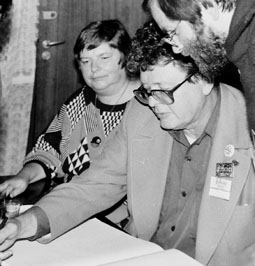„Jeden człowiek nie może zmienić historii.”
Postać: Thornberg
Sam Hall
Poul William Anderson – amerykański pisarz science fiction i fantasy.
Używał pseudonimów A.A. Craig, Michael Karegeorge, Winston P. Sanders.
Jego rodzice pochodzili z Danii, ojciec nosił nazwisko Andersen, ale w czasie służby wojskowej w czasie I wojny światowej zmienił na bardziej anglosaskie „Anderson”. Przez krótki okres swojego życia, po śmierci ojca, Poul mieszkał z matką w Danii. Rodzina wróciła do Stanów po wybuchu II wojny światowej.
Wychował się w Teksasie i Minnesocie. W roku 1948 ukończył fizykę na Uniwersytecie Minnesota. Interesował się również historią, językiem i literaturą rodzinnego kraju rodziców. Wiedzę tę wykorzystał później w swojej książkach. Poruszał się swobodnie zarówno w tak zwanej twardej fantastyce, jak i w fantasy.
Jego córka, Astrid, wyszła za mąż za znanego pisarza s-f Grega Beara.
Debiut literacki Andersona to opowiadanie napisane wspólnie z F.N. Waldropem Tomorrow’s Children w 1947. Był członkiem Fantasy Society w Minneapolis, gdzie początkowo mieszkał. W 1952 roku wydał pierwszą powieść Vault of the Ages. Był redaktorem i wydawcą wielu książek.
Był szóstym przewodniczącym Science Fiction and Fantasy Writers of America, przejmując urząd w 1972.
Zmarł na raka 31 lipca 2001 po miesięcznym pobycie w szpitalu.
Wikipedia

„Jeden człowiek nie może zmienić historii.”
Postać: Thornberg
Sam Hall
Now I killed a man they said
So they said, so they said
Oh I killed a man they said
Yes they said
I killed a man they said
And I left him layin dead
Cause I bashed his bloody head
Blast his eyes. (ang.)
Sam Hall
Źródło: Sam Hall, ludowa piosenka angielska
“Here was more than a question of law; it was a matter of whose will should prevail.”
The Sorrow of Odin the Goth (p. 433)
Time Patrol
Section 1 “Marque and Reprisal”, Chapter IX (p. 69)
The Star Fox (1965)
“A little careful pushing, and they’ll bury the hatchet all right—in each other.”
Źródło: Brain Wave (1954), Chapter 9 (p. 76)
“Mortal combat corrupts, and war corrupts absolutely.”
Źródło: There Will Be Time (1972), Chapter 10 (p. 107)
“Know that against time the gods themselves are powerless.”
The Sorrow of Odin the Goth (p. 457)
Time Patrol
Delenda Est (p. 177)
Time Patrol
Źródło: Three Hearts and Three Lions (1961), Chapter 12 (p. 101)
“It was lonely, not even knowing yourself.”
Źródło: Three Hearts and Three Lions (1961), Chapter 4 (p. 41)
“Did ignorance save his freedom, or merely his illusion of freedom?”
Źródło: There Will Be Time (1972), Chapter 12 (p. 130)
“You cannot imagine how wearisome existence grows, alone and immortal.”
Źródło: Three Hearts and Three Lions (1961), Chapter 19 (p. 177)
Often referred to as Anderson's Law.
Cited in:
Project Management: A Systems Approach to Planning, Scheduling, and Controlling by Harold Kerzner. Google Books http://books.google.com/books?id=4CqvpWwMLVEC&pg=PA246. Accessed September 5, 2009.
Checkland, P.B. (1985). Formulating problems in Systems Analysis. In: Miser, H. J. and Quade E. S. (eds.) (1985). Handbook of Systems Analysis: Overview of Uses, Procedures, Applications, and Practice. Chapter 5, pp. 151-170. North-Holland, New York.
Attributed
“Pioneering is an unlimited chance to become the biggest frog, provided the puddle is small enough.”
Źródło: The Enemy Stars (1959), Chapter 5 (p. 31)
“People usually take for granted that the way things are is the way things must be.”
Foreward (p. v)
The Enemy Stars (1959)
“Be calm. A man can do but little. Enough if that little be right.”
Źródło: There Will Be Time (1972), Chapter 11 (p. 126)
Źródło: Harvest of Stars (1993), Ch. 63
““Are you that afraid to die?”
“No. I simply like to live.””
Źródło: Tau Zero (1970), Chapter 7 (p. 78)
“The last thing any sane person wants is a jihad.”
Section 2 “Arsenal Port”, Chapter VIII (p. 133)
The Star Fox (1965)